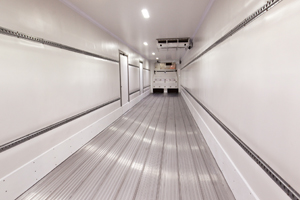Reefer Manufacturers Seek Delay in Adoption of New EPA Proposal

This story appears in the May 18 print edition of Transport Topics.
Manufacturers of refrigerated trailers and trailer refrigeration units are seeking a delay in adoption of a new federal regulation that could have a profound effect on the equipment used by reefer fleets.
Three suppliers to the reefer industry are urging the U.S. Environmental Protection Agency to push back from January 2017 until at least January 2020 implementation of its Protection of Stratospheric Ozone proposal, which addresses refrigerants used by trailer refrigeration units (TRU) and foam-blowing agents used by trailer makers.
Those filing formal comments in the proceeding include Utility Trailer Manufacturing Co. and the trailer refrigerated unit manufacturers Carrier Transicold and Thermo King.
The final rule has been before the White House Office of Management and Budget since April 24 and could be published in June. It is part of EPA’s SNAP program, or Significant New Alternatives Policy, which regulates industrial chemicals that affect high-altitude ozone and may also be greenhouse gases.
“Utility does not believe it feasible to comply with the EPA’s proposed implementation date of Jan. 1, 2017, and Utility requests that the agency extend the implementation date by three years, to Jan. 1, 2020, at the earliest,” Jeffrey Bennett, the company’s vice president of engineering and product development, said in written comments to the agency. Utility is one of North America’s largest refrigerated trailer manufacturers.
Utility said it uses “extensive amounts of urethane foam” to insulate trailer walls so that food and other products transported inside a refrigerated container maintain appropriate temperatures. The initial EPA proposal says blowing agents “create bubbles or cells” in a material’s structure.
Bennett, a member of the family that founded Utility, said there is a “lack of testing” for new foam formulations that can be used and maintained that there would be a “long lead time required to evaluate the foam’s thermal and structural properties and its performance in real-world conditions.”
He continued, “A prototype formulation failed at less than half the number of abrasion cycles compared with the current . . . formulation. Such a foam delamination failure could cause a refrigerated trailer to collapse under load, given the right circumstances.”
Nanette Lockwood, a policy director for Ingersoll-Rand, the parent of Thermo King, told the agency that new substitute products should “be considered viable only after the energy-efficiency performance of the intended systems is deemed to be comparable.”
Lockwood said using poor-quality refrigerants means diesel-powered reefer units have to run longer to do the same work, thereby burning more fuel and generating more emissions.
Ingersoll-Rand is particularly interested in keeping the refrigerant known as R404A around for a while. “We caution delisting of R404A in these applications for new or existing units before 2020 because our refrigerant of choice has not yet been approved by EPA and our distribution channel involves thousands of small businesses that need to be fully trained,” the company said.
Requests for comment from EPA were not returned.
The SNAP program was started in 1994 to eliminate chlorofluorocarbons, or CFCs, which were used as aerosol propellants. When concentrated at high altitudes, CFCs deplete ozone that blocks radiation in the earth’s atmosphere.
Hydrofluorocarbons, or HFCs, have been a popular substitute, but EPA says HFCs linger in the atmosphere for more than 250 years and are 20,000 times worse than carbon dioxide as a greenhouse gas.
United Technologies Corp., parent of Carrier Transicold, also recommended pushing back certain deadlines to 2020.
Comments from Maersk Container Industry, a part of A.P. Möller-Maersk Group, supported EPA’s general efforts but said “we will be able to market our own climate-friendly solution” by 2018.

